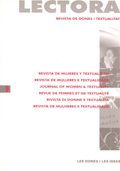Pensar el mundo y actuar en el mundo. Del mal radical a la banalidad del mal en el pensamiento de Hannah Arendt
Abstract
These pages prove how A Raport on the Banality of Evil forces Arendt to re-think the category of Radical Evil, in which she had based The Origins of Totalitarism. She now has to use a new interpretative criteria, based on the idea of the Banality of Evil, in which the author of a series of criminal acts is not a monster but a person unable to think. The notion of the Banality of Evil rises some discussion around the meaning of conscience, and the will that this meets in the responsibility of the individual, the tool to understand and fight Evil. These questions end up converging in the analysis of a basic moral issue, the judgment, which opens new perspectives on The Life of the Mind.Downloads
Published
How to Cite
Issue
Section
License
The Author retains ownership of the copyright in this article and grants Lectora: revista de dones i textualitat the rights to print publication of the Article. The work will be available under a Creative Commons Attribution-Noncommercial-No Derivative Works license, by which the article must be credited to the Author and the Journal be credited as first place of publication.
The Author is free to enter in seperate, additional contractual agreements for the non-exclusive distribution of the work as published in this journal (such as institutional repositories or a book), as long as the original publication in Lectora is credited.
The Author is encouraged to post the work online (eg in institutional or thematic repositories, or in their website), as it can lead to productive exchanges as well as to a greater citation of the published work (see The Effect of Open Access).




